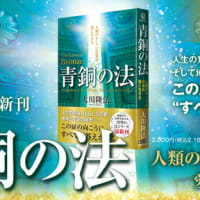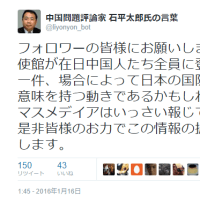理想国家日本の条件 自立国家日本
http://blog.goo.ne.jp/sakurasakuya7/e/7ecdb3347e83d1d39e5b0d68ce7d4b08

朝日新聞、本格的に世界中でフルボッコに
インド有力紙「この最悪の新聞はアジアを危険に陥れた」
http://asianews2ch.jp/archives/40633886.html
転載、させていただいた記事です
【朝日新聞慰安婦誤報問題~小池百合子議員が初の国際発信~】
Japan In-Depth 9月1日(月)22時1分配信
http://zasshi.news.yahoo.co.jp/article?a=20140901-00010004-jindepth-pol
朝日新聞の慰安婦問題報道での訂正が日本側だけでしか伝えられず、肝心の国際社会への発信がないことを
この連載コラムで書いてきたが、インドの有力新聞にその「朝日新聞の訂正」の事実が明確に掲載された。
しかも日本側からの発信である。
私の知る限りでは、朝日新聞の大訂正が外国の英語のメディアできちんと伝えられたのは、
これが初めてのようだ。この種の対外発信が日本にとっていかに重要であるか、説明の要もないだろう。
インドの有力経済紙『ミント』8月28日付は寄稿ページに「東アジアの歴史戦争を終わらせる」という
見出しの論文を掲載した。その冒頭部分には以下のような記述があった。
「1990年代に朝日新聞は元日本軍将兵の吉田清治の『慰安婦』についての証言に基づく一連の
記事を掲載することで日本国内と韓国で大騒動を起こした。この『慰安婦』というのは第二次世界大戦中に
日本軍によって強制的にセックスの奉仕をすることを強いられたとされる朝鮮女性たちのことだった」
「だが朝日新聞はこの8月に、この吉田という人物の告白はまったく根拠がなかったことを認め、慰安婦に
ついてのこれまでの一連の記事を支えた核心の証拠を取り消した。この取り消しはいま日韓両国にその
当初の一連の記事が起こしたと同じような当惑や外交的いがみあいを引き起こしているようだ」
「しかし日韓両国とも歴史の政治的あるいは不注意な乱用を許して相互関係をさらに荒立たせるべきでは
ない時に、この朝日新聞のずさんな報道は最悪のジャーナリズムという以上に、北東アジア地域での
外交関係に新たな危険な要素を持ち込んでしまった」
以上のように、この論文は朝日新聞の慰安婦問題報道の今回の取り消しについてはきわめて明確に書いていた。
この論文の筆者は衆議院議員の小池百合子氏だった。小池議員は周知のように防衛大臣、環境大臣などを務め、
現在は自民党広報委員長のポストにある国際派政治家である。
調べてみると、この小論文は小池氏の個人の資格で「プロジェクト・シンジケート(Project Syndicate)」という
国際的な意見発表のジャーナリズム組織を通じて英文で発表されていた。プロジェクト・シンジケートは世界各国の
オピニオンリーダーや各界専門家が加わる配信網で、受け手側には合計154カ国約500の新聞と雑誌が加盟
している。記事は英語が主体だが、アラビア語、中国語などにも訳されるという。
小池氏はこの論文で日韓両国が慰安婦などの歴史問題で争うことの危険性を指摘し、両国が過去よりも未来を
みすえて進むことを提案していた。時宜を得た対外発信の珍しい実例として紹介した次第である。
なおこのインドの新聞に掲載された小池論文へのリンクは以下となる。
http://www.project-syndicate.org/commentary/yuriko-koike-urges-japanese-and-south-korean-leaders-to-emulate-france-and-germany/chinese
古森義久
[Japan In-Depth 2014.9.1]
http://zasshi.news.yahoo.co.jp/article?a=20140901-00010004-jindepth-pol
インド Mint紙に掲載された英文
http://erakokyu.blog.jp/archives/asahi-140902.html
Yuriko Koike | Ending East Asia’s history wars
Japan and South Korea need to take responsibility for the future, not obsess about the past
Georges Clemenceau, who, as France’s prime minister, led his country to victory in World War I, famously said that “war is too important to be left to the generals”.
Japan is now discovering that history is too important to be left to newspaper editors. In the 1990s, the newspaper Asahi Shimbun caused a firestorm at home and in South Korea by publishing a series of articles, based upon testimony by the former Japanese soldier Seiji Yoshida, on “comfort women”
—Koreans forced to provide sexual services to the Japanese Imperial Army during World War II. Asahi has now admitted that the soldier’s confessions were unfounded, and has disavowed the core supporting evidence for the articles.
That retraction appears to be causing as much embarrassment—and diplomatic vitriol—in Japan and South Korea today as the original series did. But, at a time when both countries cannot afford to permit partisan or sloppy abuses of history to roil their bilateral relations,
Asahi’s careless work has turned out to be more than abysmal journalism
it has introduced a dangerous element into regional diplomacy.
(朝日新聞のずさんな報道は最悪のジャーナリズムという以上に、北東アジア地域での外交関係に新たな危険な要素を持ち込んでしまった)
Some say that Japan and South Korea should follow the example set by France and Germany. Reconciling in the first two decades following the Nazi Occupation of France, these countries’ leaders understood that their security and economic ties were far too important to their citizens’ wellbeing to allow the old hatreds to fester.
They knew that the unimaginable violence of WWII was a direct result of the antagonism that had festered since the Napoleonic Wars and that were allowed to persist after 1918. In Charles de Gaulle and Konrad Adenauer, France and Germany had two of the twentieth century’s greatest statesmen, leaders who were able to discern the broad sweep of history through the fog of quotidian politics.
Their loyalty was not only to the citizens who elected them, but also to the generations of the past that had endured the consequences of Franco-German enmity, and to generations yet to come, which would benefit from reconciliation.
Of course, given that Japan and Korea have not fought a series of wars against each other, their relationship is not same as that between Germany and France. But it is clear that no one will benefit from a new round of heated historical debate. To avoid this, political leaders such as de Gaulle and Adenauer are needed. Only when we can discuss the past without endangering the future will the countries of Northeast Asia be able to establish a truly durable structure of peace.
As Admiral Dennis C. Blair, a former commander of the US Pacific Fleet, stated at a recent conference,
“The history of Asia from the 1930s to about 1955 or so was not pretty in any way….
I don’t think any country can have a monopoly on righteousness, or on guilt and shame” for that time. Blair added that “the attempt to hold a ‘we were right’ and ‘you were wrong’ sweepstakes is not going to help our children and grandchildren understand what happened there”.
Japan and South Korea need to take responsibility for the future, not obsess about the past. A recent Japanese government white paper called South Korea the country “that shares the closest relationship with Japan historically and in areas such as economy and culture”.
No doubt, many, if not most, South Korean foreign-policy experts and strategists share that sentiment. But it will take committed leadership to transcend the history wars and tap the full potential of Japanese-Korean cooperation, something that both countries’ key ally, the US, strongly desires, as it seeks to draw China into a lasting and peaceful Asian order.
For too long, intemperate historical debates—often driven by biased newspaper accounts—have poisoned bilateral relations. Now, as another war of words heats up, Japanese and South Korean leaders need to step back, recognize where the real interests of their people lie, both today and in the future, and calmly begin to take the measures required to ensure durable reconciliation.
c2014/PROJECT SYNDICATE
Yuriko Koike, Japan’s former defence minister and national security adviser, was chairwoman of Japan’s Liberal Democratic Party’s General Council and currently is a member of the National Diet.
http://www.livemint.com/Opinion/DinxiL2DWiWYc4TwBgoczN/Yuriko-Koike--Ending-East-Asias-history-wars.html
・過去記事
【社説】 「安倍首相、中国牽制のための価値観外交考え直せ」「日本にとって
中国の重要性、インドの比ではない」…朝日新聞★4
http://news22.2ch.net/test/read.cgi/newsplus/1188029887/
・

















※コメント投稿者のブログIDはブログ作成者のみに通知されます